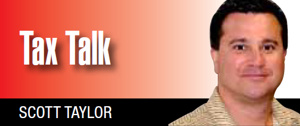So, you filed your tax return and, like a dieter after a binge, you’ve vowed to never again let your financial life get so out of whack. No more shoeboxes full of receipts or waiting until the last minute to file.Getting organized and taking the stress out of filing taxes may be more complicated than clearing the cookies out of the pantry, but you can whip the business side of your trucking business into better shape.
Here’s where to start:
Review your NOA
A notice of assessment (NOA) confirms that your tax return was accepted as filed or outlines any adjustments made by Canada Revenue Agency (CRA). For your personal return, it will list your taxable income and any carry-forward amounts you can apply in the future, as well as the amount you can contribute to an RRSP or tax-free savings account this year.
Check CRA’s assessment against your tax return. If there’s a discrepancy, or you disagree with CRA’s findings, contact the tax center that processed your return (better yet, call your accountant). You have one year from the filing deadline of the return in question to make an appeal.
|
Now that the personal tax deadline is over, talk to your accountant about scheduling reviews of your financial statements at the end of each quarter.
|
You can also amend your return once you’ve received your NOA. The easiest way is to use the “change my return” option found in My Account at www.cra.gc.ca/myaccount. Be ready with supporting documents to back up your claim.
Take smaller bites
In the heat of a tax deadline there’s no time to plan, only to plow through receipts and fill out forms. Now that the personal tax deadline is over, talk to your accountant about scheduling reviews of your financial statements at the end of each quarter.
A quarterly review can highlight gaps in information that probably would have been overlooked or ignored by the accountant with your shoebox. With a deadline looming, do you really think he’s going to call and ask questions about missing statements or receipts? I’ll bet not. So what value and expertise do you think you received?
Mistakes within your business income statement aren’t always simple to identify or fix. Owner-operators bring their tax returns to me all the time for analytical reviews and sometimes the mistakes I find are obvious and easily corrected by submitting an adjustment letter to CRA. However, corrections for mistakes in the “grey” areas always are cause for concern as now you’re sticking them under CRA’s nose. Better to get it right the first time.
With quarterly reviews, you’ll be in a better position to take advantage of deductions and tax-saving strategies before the year is over and it’s too late. You can more accurately estimate your tax payments so you’re not faced with a “surprise” tax bill that squeezes your cash f low. Better still, you’ll gain a working knowledge of your finances and tax obligations.
Get help
A good accountant will pay for him-self. While you’re out earning a living, it’s his job to help you reduce your tax bill, budget for expenses, decide whether to incorporate, and plan for retirement.
Do you use a friend or family member for accounting or a reputable business? No accountant worth his salt is going to miss a deadline because he can’t figure out the tax rules or he got involved doing something else and forgot.
If you think you’re too far gone to be helped, that your “system” is beyond repair, then think again. I guarantee you that I’ve seen (and fixed) far worse than anything you can throw at me. In fact, I invite you try. Consider it the first step in the planning process.
Scott Taylor is vice-president of TFS Group, providing accounting, bookkeeping, tax return preparation, and other business services for owner/operators.
Learn more at www.tfsgroup.com or call 800-461-5970.
